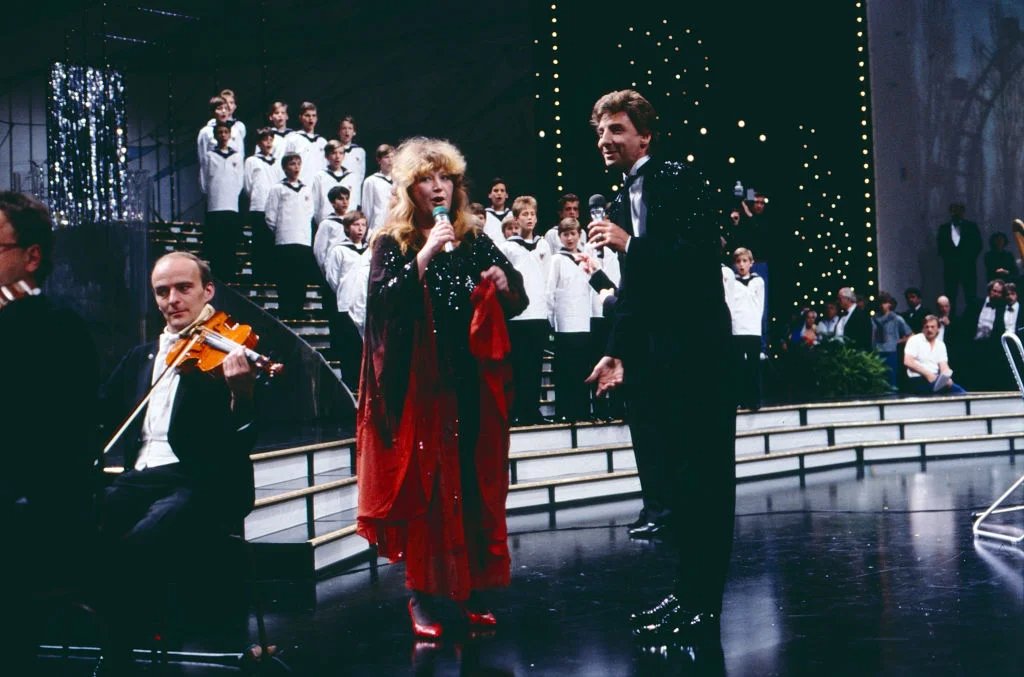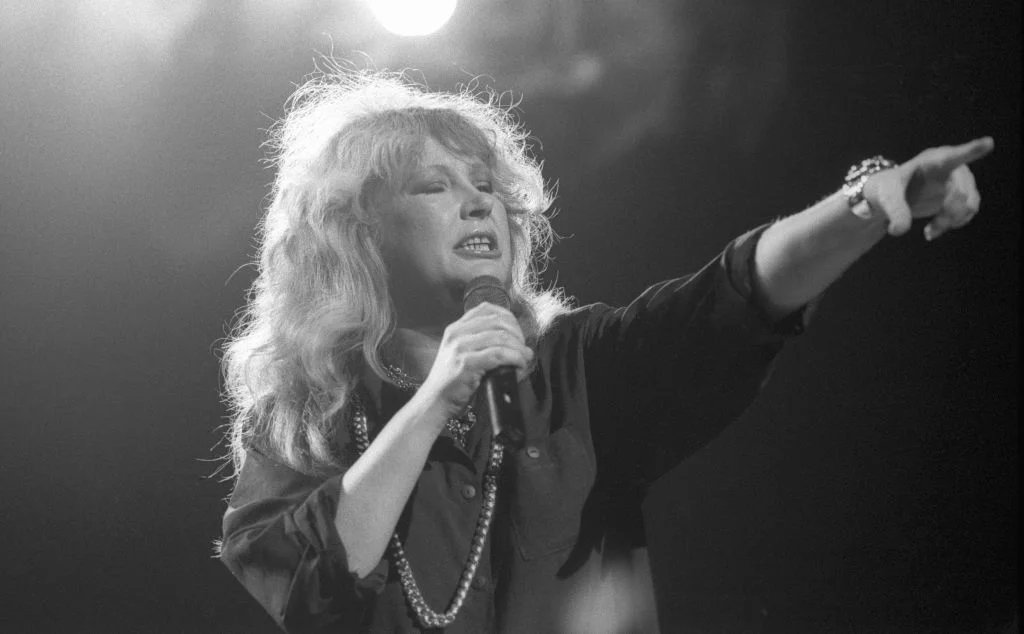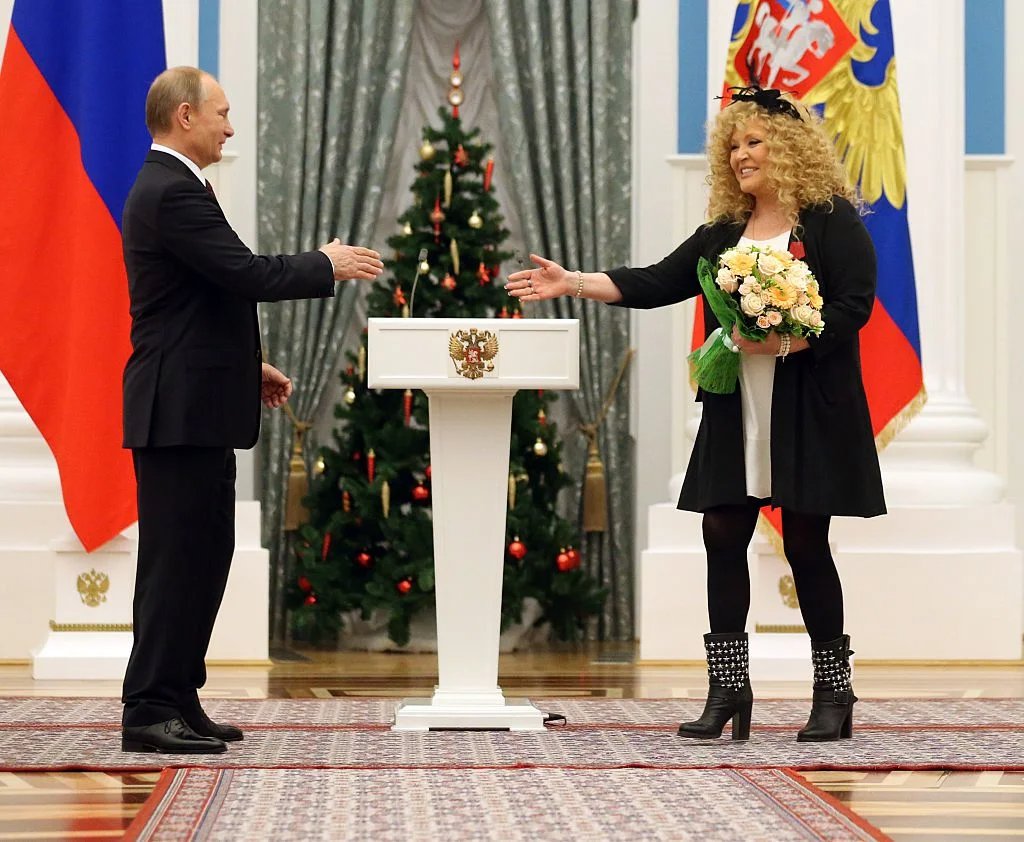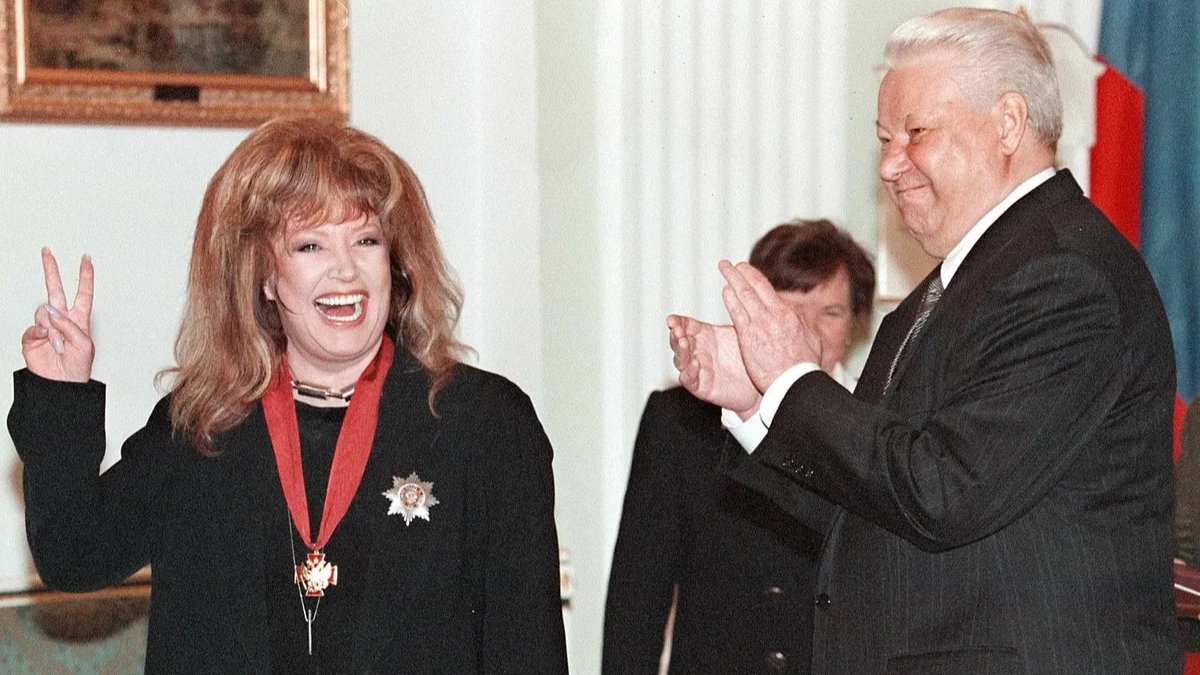“For a long time I have known Vladimir Putin to be an intelligent person,” a woman with an explosion of red hair says, gazing at the camera from an armchair in a 2007 political ad. “I will vote for United Russia — for his party, and, therefore, for him. I advise you to do the same.”
Jump forward 15 years and the same woman addresses an open letter to Russia’s Justice Ministry, asking it, with her 3.5 million Instagram followers as witnesses, to label her a “foreign agent” in solidarity with her husband, who has just received the designation. At the end of the message, she calls for peace, freedom of speech, and the end of “our children dying for illusory goals” — a clear reference to the war in Ukraine that began six months beforehand.
The woman is Alla Borisovna Pugacheva, whose decades of fame as a singer and performer have earned her nicknames including “the goddess” and “the tsarina of Russian pop”, and whose fame in the 1970s was so great that a well-known joke of the period described Soviet leader Leonid Brezhnev as “a minor government official in the Pugacheva era”.
Unlike the Soviet era, the Pugacheva one is arguably ongoing. Ever since Pugacheva first rose to fame in 1975, few Russian stars have commanded such a large and loyal fan base. Few, too, have seemed so remarkably impervious to the vicissitudes of regime change; Pugacheva lived — and for the most part thrived — under Brezhnev, Andropov, Chernenko, Gorbachev, Yeltsin, and, until recently, under Putin. However, in the wake of Russia’s war in Ukraine, it appears that the special status and effective impunity she has enjoyed for decades may no longer be guaranteed.
Breakthrough: ‘Arlekino’
The year 1975 was a fateful one for Pugacheva. When the Soviet Culture Ministry granted the young singer permission to take part in the Golden Orpheus International Song Contest in Bulgaria, Pugacheva chose “Arlekino” (Harlequin) by Bulgarian composer Emil Dimitrov as her entry, rearranging the song, translating its lyrics into Russian, and adding a rhythmic cackle to the end of the chorus.
It was to prove her big break: the Bulgarian public responded rapturously to her performance and demanded an encore, and the competition jury unanimously awarded Pugacheva the competition’s grand prize.
Reminiscing about the start of her career in a 2015 interview for Novaya Gazeta, Pugacheva speculated that her career took off because
“There was no freedom in the USSR. … That was the only reason people paid me any attention — I had that freedom.”
Pugacheva did indeed seem more liberated than her far more sedate and chaste contemporaries, with her ditzy charm and instantly recognisable red mane. In the video for “Arlekino”, Pugacheva lunges and twirls in a bell-bottomed jumpsuit, laughing maniacally between verses about someone who feels they must “be funny to everyone” and for whom “the only reward is laughter”.
Once “Arlekino” had blown up, Pugacheva later recalled, Western promoters would contact her asking to speak to her producer, and she would have to direct them to “some old drunk in the USSR’s State Concеrt Association” who would say, “We’ll think about it.”
Pugacheva could only travel for concerts the association approved, and at first she wasn’t allowed to perform as a soloist, which required a special licence. Following her success in Bulgaria, she spent two years lobbying for one, spending the intervening time appearing only with bands that would let her perform her own songs.
One of those bands was Kharkiv’s Rhythm. The band served as a cover for Pugacheva: she was listed as part of the group but could perform as many solo songs as she wanted. One member of Rhythm, Alexander Litvinenko, later recalled that tickets for her first solo concert were handed out behind the scenes with no publicity and the group had had to learn Pugacheva’s set of 14 songs by ear from cassette recordings.
“The audience was in shock at her performance. They expected Alla to just come out and sing. But she talked, communicated … I had never seen anyone work like that before," Litvinenko said.
When she finally received permission to tour alone in 1977, fashion designer Vyacheslav Zaitsev created Pugacheva’s signature style — a loose robe and big curls — for her first tour. And if her appearance already seemed a far cry from the traditional image of Soviet singers, Pugacheva’s energetic and engaging stage presence challenged the norm even more dramatically.

Alla Pugacheva and Barry Manilow at a concert in Vienna, 1987. Photo: kpa / United Archives / Getty Images
Oranges and Pugacheva
By the 1980s, Pugacheva had amassed so much star power that even the all-powerful authorities were calling on her for favours. In May 1986, a month after the Chernobyl Nuclear Plant meltdown, the first charity concert in Soviet history was held to raise funds for its victims.
Not only was it Pugacheva who came up with the idea, but she also organised the entire event at the Olympic Sports Palace in Moscow, which featured a groundbreaking live link-up with a studio in Kyiv where many of the disaster’s victims and first responders were gathered to watch.
Pugacheva and her team travelled to Ukraine a few months later to perform a second concert near Pripyat, the now abandoned city next to Chernobyl.
As the scale of the disaster had been hushed up domestically, none of the performers considered the potential consequences that performing at the site of a recent nuclear disaster could have for them.
Three decades later, Pugacheva recalled feeling that it would have been impossible to turn down the request.
“Someone from the government flew there and asked, ‘What do you need most of all? We’ll try to get you anything.’ And they replied, ‘Oranges! And Pugacheva!’ How could I refuse?”
In the same interview, Pugacheva revealed that one of her team had died a year after the Chernobyl concert from a long-term illness that had suddenly worsened dramatically. She also revealed she continued to suffer from endocrine problems after the visit to Ukraine. “I was told to wear a hat, but I refused. I tied on a huge bow to cover my head,” she recalled.
Some of the 9,000 clean-up workers who watched her perform were already dying. Pugacheva, now 37, began to experience serious health issues herself after the trip, as well as problems with her voice.
The final People’s Artist of the USSR
By the end of the 1980s, Pugacheva had cemented her superstar status, having sold over 150 million records and become undoubtedly the Soviet Union’s greatest living pop star. In the last days of communism, even Mikhail Gorbachev took a moment to acknowledge her impact, naming her a People’s Artist of the USSR in his final decree as president before the dissolution of the Soviet Union.
During the Soviet phase of her career, Pugacheva’s political opinions — if they were present at all — had had to be disguised in her music. Some listeners interpreted the lyrics of “Arlekino” as commenting on the struggles of artists living under totalitarian regimes; others have suggested that her song “Krysolov” (Pied Piper), which includes lyrics about the “greedy envy of rats”, was a response to Soviet leader Yury Andropov’s harsh crackdown on workplace absenteeism and the shadow economy.

Photo: Frans Schellekens / Redferns
Beyond her songs’ lyrics, Pugacheva’s performance decisions were sometimes also provocative. When advised not to program the subversive song “Kings Can Do Anything” at concerts attended by Soviet officials, Pugacheva did the exact opposite, openly gesturing to the apparatchiks in the VIP seats as she belted out the chorus: “Kings can do anything, kings can do anything at all! / But whatever you say, not a single king can marry someone he loves.”
These cheeky gestures were as close as Pugacheva came to making political statements during the Soviet era. But after the collapse of the USSR, the singer was finally able to express her views publicly without fear of repercussions. Ahead of the 1996 presidential elections, when Russia seemed in real danger of reverting to a communist regime, Pugacheva told an interviewer that she would vote for Yeltsin and urged everyone to do the same.
Souring on Putin
Pugacheva’s initial support for Vladimir Putin began to wane in the late 2000s. In the same 2007 advert in which she pledged her vote to Putin, Pugacheva also expressed confidence that he would remain true to his word and not seek a third term. “He said he won’t run for a third term, so he won’t run for a third term,” she said.

Vladimir Putin and Alla Pugacheva at an award ceremony in the Kremlin. Photo: Sasha Mordovets / Getty Images
When Putin did indeed appear on the ballot again in 2012 after a brief hiatus as prime minister, Pugacheva publicly announced that she would not be voting for him, though she still claimed to respect him “very much”. She continued to mix flattery with open criticism when speaking of Putin: “even a politician as smart and interesting as he is shouldn’t occupy a single position for too long,” she said, adding that
“To have a new president is normal. What’s not normal is for someone to keep clinging to power.”
Instead, Pugacheva campaigned tirelessly for Mikhail Prokhorov, an oligarch who challenged Putin unsuccessfully as an independent candidate. The same year, Pugacheva further upped the ante when she publicly voiced her support for the five members of Pussy Riot jailed for their unsanctioned anti-Putin performance in Moscow’s Cathedral of Christ the Saviour. By 2015, Pugacheva even went so far as to compare the Russian president to the “underworld boss of a criminal country” in an interview on state television.
In spite of these comments, Pugacheva continued to accrue state honours even after her decision to stop performing in 2009. In 2014, the same year that Russia annexed Crimea, Putin personally presented her with the Order for Merit to the Fatherland.
Foreign agency
The war in Ukraine, however, appears to have ushered in a new era for Pugacheva, both in terms of her readiness to make political statements and in how the once deferential Russian authorities react to her comments.
Pugacheva neither openly supported nor condemned Russia’s illegal seizure of Crimea in 2014, but like many other Russians, she clearly found herself unable to remain silent over the full-scale invasion of Ukraine in 2022. Pugacheva and her Russian-Israeli husband Maxim Galkin, one of Russia’s best known comedians, relocated to Israel with their children shortly after the invasion.

Pugacheva with her husband Maxim Galkin. Photo: Pugacheva’s Instagram page
Russia’s Justice Ministry had just added Galkin to their list of “foreign agents”, alleging that he had been paid by Ukrainian officials to carry out unspecified “political activities.” This accusation prompted Pugacheva’s now-infamous post on Instagram, in which she demanded that she also be named a foreign agent in solidarity with her spouse, whom she described as an “honest, decent, sincere and incorruptible Russian patriot”.
“We’ll win without her songs,” State Duma Deputy Chairman Pyotr Tolstoy said in reaction to Pugacheva’s post, before suggesting that the singer had “lost touch with reality” and would “no longer find support among decent Russian people”. TV presenter and arch Kremlin propagandist Vladimir Solovyov posted “RIP, Alla Pugacheva” on social media, adding that “old age doesn’t always mean wisdom. Sometimes it just means old age”.
Detractors took special issue with the phrase “illusory goals”, which Pugacheva used to describe the aims of the war. Soon after the Instagram post, propaganda channel RT’s editor-in-chief Margarita Simonyan began making accusations against the singer, even claiming that Pugacheva had expressed support for the armed Chechens who seized the Dubrovka Theatre in Moscow in 2002.
Pugacheva had not, of course, supported the gunmen; she had merely reminded people of what she called the “incomprehensible, foul-smelling” Second Chechen War, “in which both sides suffered”.
Pugacheva responded to Simonyan’s allegations simply and scathingly. “The lower the intellect, the louder the insults. Live in peace, my country,” she wrote.
In November, the Russian Orthodox Church joined the fray to demand an apology from Pugacheva for what it called her “controversial statements” and “insults” about the war. Others, too, have filed official complaints against the singer with the police, requesting that she be investigated for “discrediting the Russian armed forces”.
Despite these various gestures of reprimand, no criminal case has been opened against Pugacheva, nor has she been added to the list of so-called “foreign agents” as she requested. A recent post by Galkin suggested that the pair have now left Israel for Latvia.
Pugacheva summed up her disillusionment with Russia and her disgust at the many prominent people who turned on her for her views on Ukraine in an unusually frank and emotional Instagram post.
“My tired voice still sounds,” she wrote in November. “Freedom is the best kind of wealth. And I keep it in me, I live by it and will try to stay alive until the triumph of light over darkness, the triumph of good over evil, the triumph of truth over slander. … You shall be hearing from me again!”
Join us in rebuilding Novaya Gazeta Europe
The Russian government has banned independent media. We were forced to leave our country in order to keep doing our job, telling our readers about what is going on Russia, Ukraine and Europe.
We will continue fighting against warfare and dictatorship. We believe that freedom of speech is the most efficient antidote against tyranny. Support us financially to help us fight for peace and freedom.
By clicking the Support button, you agree to the processing of your personal data.
To cancel a regular donation, please write to [email protected]

